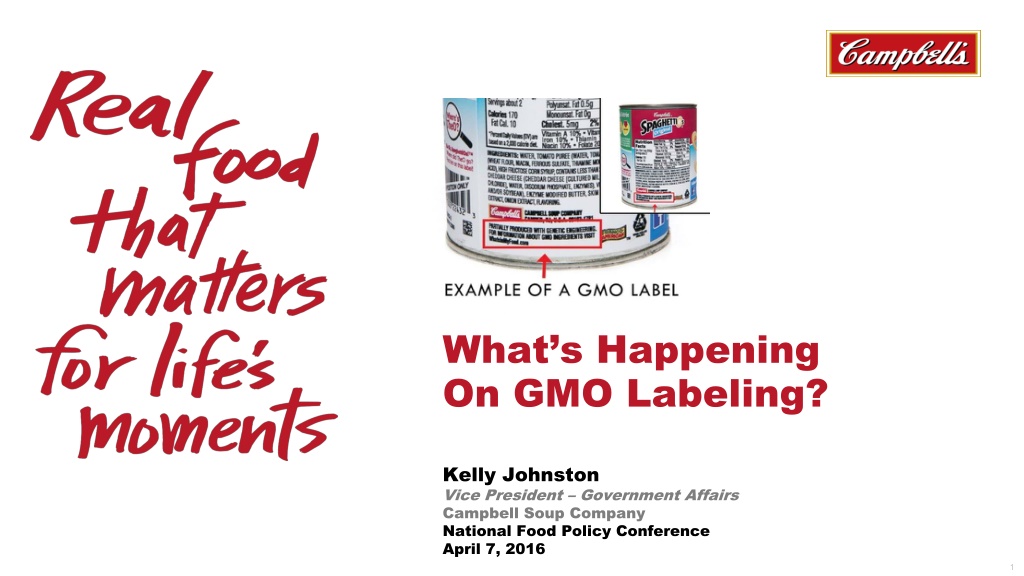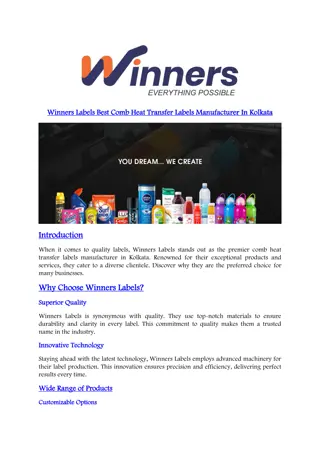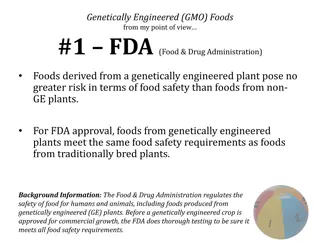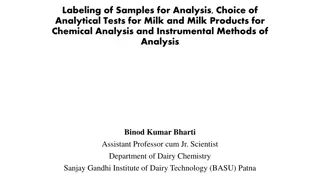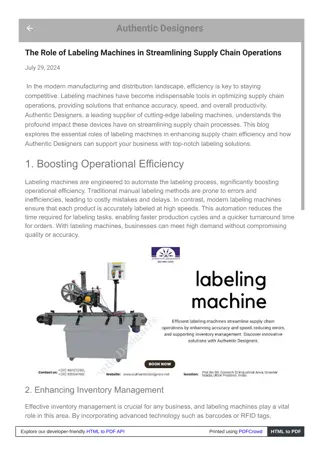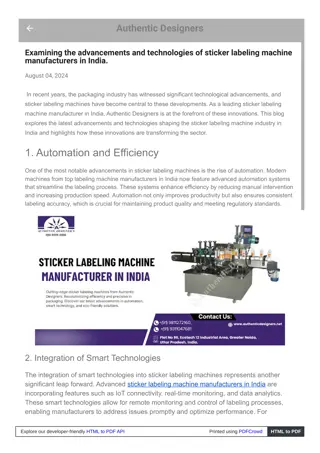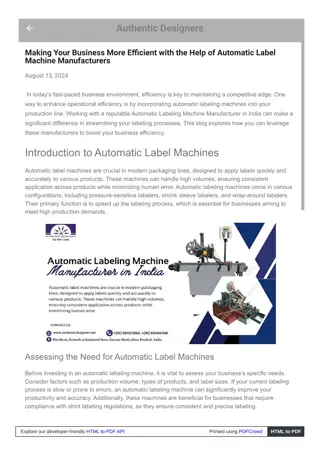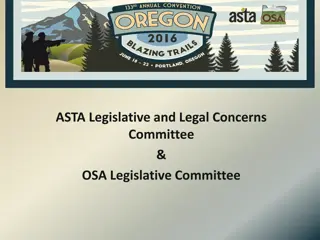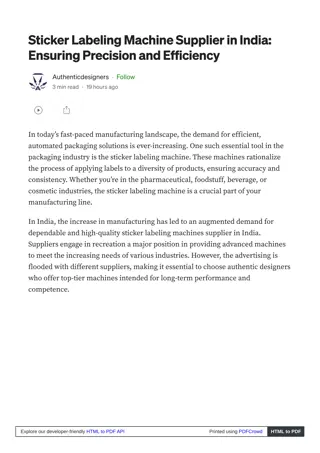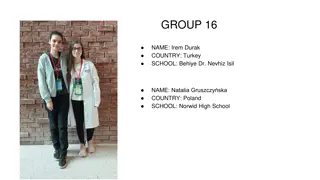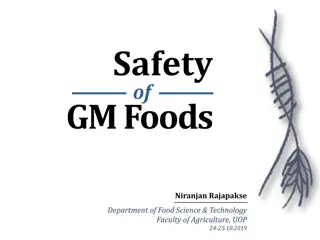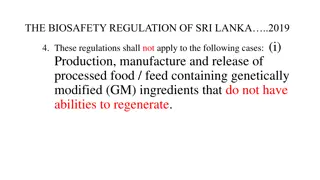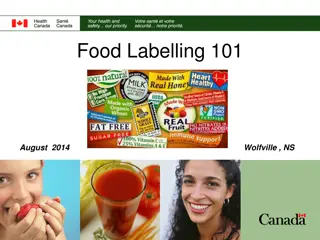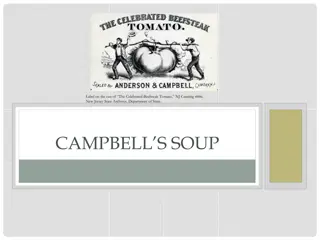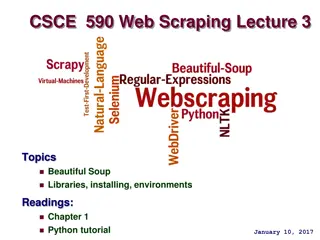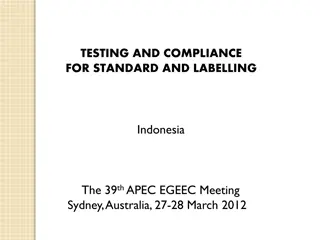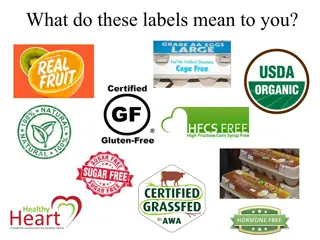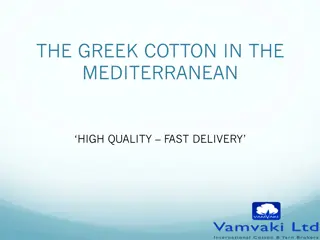Understanding the Current Landscape of GMO Labeling: Insights from Campbell Soup Company
Explore the evolution of GMO labeling, from defining GMOs to legislative developments and industry responses. Key points include the history of GMOs in food, global perspectives, state mandates like Vermont's Act 120, and how major food corporations are navigating the changing landscape. Follow the discussions around national standards, voluntary labeling, and ongoing legal challenges, providing a comprehensive view of the GMO labeling debate.
Download Presentation

Please find below an Image/Link to download the presentation.
The content on the website is provided AS IS for your information and personal use only. It may not be sold, licensed, or shared on other websites without obtaining consent from the author. Download presentation by click this link. If you encounter any issues during the download, it is possible that the publisher has removed the file from their server.
E N D
Presentation Transcript
Whats Happening On GMO Labeling? Kelly Johnston Vice President Government Affairs Campbell Soup Company National Food Policy Conference April 7, 2016 1
Setting the Table What are GMO s? Plants developed through a process in which a copy of a desired gene or section of genetic material from one plant or organism is placed into another plant to achieve a desired trait, such as resistance to an insect or improving the ripening process in order to better meet a customer s market need. -- U.S. Farmers and Ranchers Alliance 2
History Why Are They In My Food? Transgenic GMOs introduced in the 1980s Examples of GMOs in Food Supply Corn (pest resistance) Soybeans (herbicide tolerance) Canola Papaya (anti virus) Sugar Beets Alfalfa Squash More coming. . . 3
State of Play Anti-GMO protests in Europe Outright bans since early 90 s Mandatory labeling laws in 64 countries But wide acceptance in U.S., Canada US FDA, 1992 GMOs are not materially different labeling not justified, but no federal preemption just guidelines. State & Federal Legislation, ballot initiatives (CA, OR, CO, WA) to mandate labeling defeated since 2002 Finally. . . . 4
Vermont Enacts Act 120 2014: First GMO label mandate signed into law Effective Date: July 1, 2016 Connecticut, Maine adopt similar laws with trigger 5
Big Food Responds Coalition for Safe, Affordable Foods Launched to establish national standards for voluntary labeling 2015: U.S. House passes HR 1599 2016: Campbell supports mandatory national GMO labeling Senate fails to break filibuster on voluntary labeling bill; Companies begin Vermont compliance 6
So, What Happens Next? Senate may still act (or not) Companies announce plans to comply with VT, nationally General Mills Mars Kellogg s ConAgra. . .others? GMA v. Sorrell legal challenge to VT law continues. . . What are we doing next? 7
From Campbell. . . From Our Blog (January 7) Our Purpose calls for us to acknowledge that consumers appreciate what goes into our food, and why so they can feel good about the choices they make, for themselves and their loved ones. Today we announced our support for mandatory national labeling of products that may contain genetically modified organisms (GMO) and proposed that the federal government provide a national standard for non-GMO claims made on food packaging. Transparency is the new coin of the realm Denise Morrison, CAGNY, Feb. 16, 2015 8
Why Now? Congress has failed in to preempt state labels 350 SKU s affected with July 1 Vermont GMO label compliance date. Vermont s label is a national label Time to get out front on GMO labeling issue 9
Key Elements of Campbell Policy Strong support for federal preemption; oppose Vermont s and other state s GMO labels Mandatory labeling must inform, even permit promotion of GM technology benefits; it must not frighten, mislead or confuse GMOs are safe Campbell will continue to use them Strong support for broad-based labeling Commitment to carry out GMA s SmartLabel ; digital disclosure to supplement the label 10
More Than Half of Consumers are Concerned About GMOs It is not as high on their list of concerns as some other food-related topics, but the majority agree it is a concern. I don't know enough about GMOs to know the positive side of the issue. I just hear negative speak about it, and have more fear - Sherilyn B. I have always heard it was bad, so I guess that is why I m concerned. - Cindy P. I'm not concerned enough about GMOs to stop a routine in my life because of their presence in my soup. Source: 2015 HealthFocus US Trend Report SOURCE: C Space GMO Label Series in Campbell s Eat Drink and Be Merry Community -July 2015 11
Majority of Consumers are Concerned About GMOs, But Few Have Changed How They Shop Most consumers aren t changing what they buy because of GMOs 22% Say that they always read the nutrition label for products they buy regularly. 58% Say that they always read the nutrition label for new products. Most consumers can t think of any food or beverage they ve started or stopped buying because of a presence of lack of GMOs. Factors such as price, taste, convenience and nutrition continue to have more influence on purchase decisions than GMOs. Only 24% can think of product that they claim they have stopped buying because they contain GMOs or claim they started buying because they re GMO-free N=390 SOURCE: LRW GMO Label Study July 2015 and C Space GMO Label Series in Campbell s Eat Drink and Be Merry Community July 2015 LRW Label Reading data from QB1. Thinking about food you eat regularly vs. new food items that you've never tried, what do you typically do when it comes to reading the nutrition label? 12
Transparency Research In preliminary research on transparency, there was an encouraging finding consumers appreciate knowing that their food uses GMOs SOURCE: C Space Transparency Series in Campbell s Eat Drink and Be Merry Community - November 2014 13
External Engagement Current phase: Reach out, listen, discuss Agri-food stakeholders FDA, USDA, Capitol Hill Robust consumer research program well underway An informal and diverse external network may advise Campbell Peer companies Agri-food stakeholders Research organizations Public interest advocates Scientific and regulatory experts 14
This Wont Be Easy Hurdles Ahead FDA labeling policy opposes mandatory labeling on the grounds that GMO foods are no materially different Commercial free speech rights may present legal & legislative hurdles (GMA vs. Sorrell) compelled speech Many legislators and stakeholders strongly oppose mandatory labeling What will we say on the label? 15
Addressing the Objections Big food imposing expensive solution on small companies Vermont has already imposed an expensive national label Slippery slope opens door to a Pandora s Box of future labeling demands Digital disclosure done right can deliver information and help alleviate that concern Disparages the technology Food companies are already disparaging the technology with non-GMO claims, many for products for which there are no GMO equivalents 16
Non-GMO Labels for foods Are these voluntary labels truthful, non- misleading and ultimately helpful to consumers? 17
Political Reality and The Opportunity Agri-food position: supports disclosure and transparency, but wants voluntary options to inform, educate consumers (e.g. digital disclosure) Consumer Group Position: We do not support a warning or a disclosure system that renders a judgment on GMOs and are certainly not seeking a ban on GMO crops. -- Gary Hershberg, Chair, Just Label It, 2015 It s time to shift from defense to offense; it is time to leap frog the issue, embrace labeling done right to protect & promote biotech benefits 19
